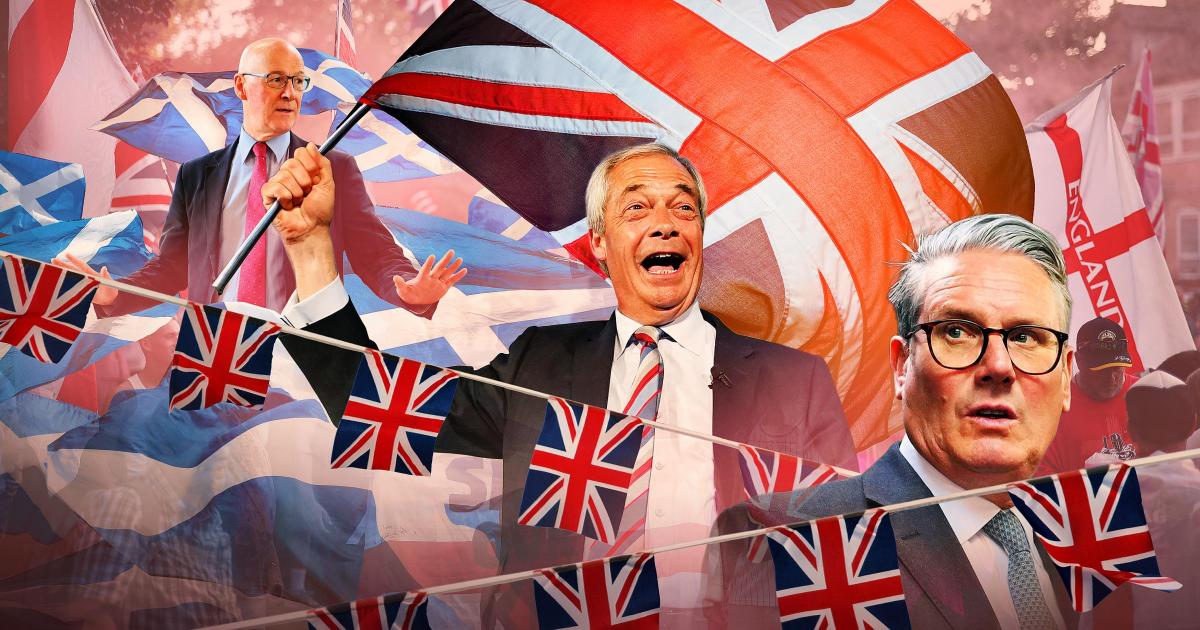That doesn’t work against Phipps. She’s brought 11 people seeking asylum into her home. She even fostered a refugee – Rima, an unaccompanied minor from Eritrea. Today, Rima has children of her own. They call Phipps “abay”, Eritrean for grandma.
Phipps is Scotland’s leading academic on issues related to refugees, and works with the Scottish Government on asylum policy. She holds the Unesco chair in refugee integration at Glasgow University, and chairs the New Scots Leadership Board. It operates in partnership with the Scottish Government, co-ordinating refugee integration. She’s also an OBE.
Her studies have taken her around the world. She regularly visited Gaza before the current conflict, in which she has lost many friends. She has also worked in nations like Zimbabwe, Ethiopia, Jordan and Sudan.
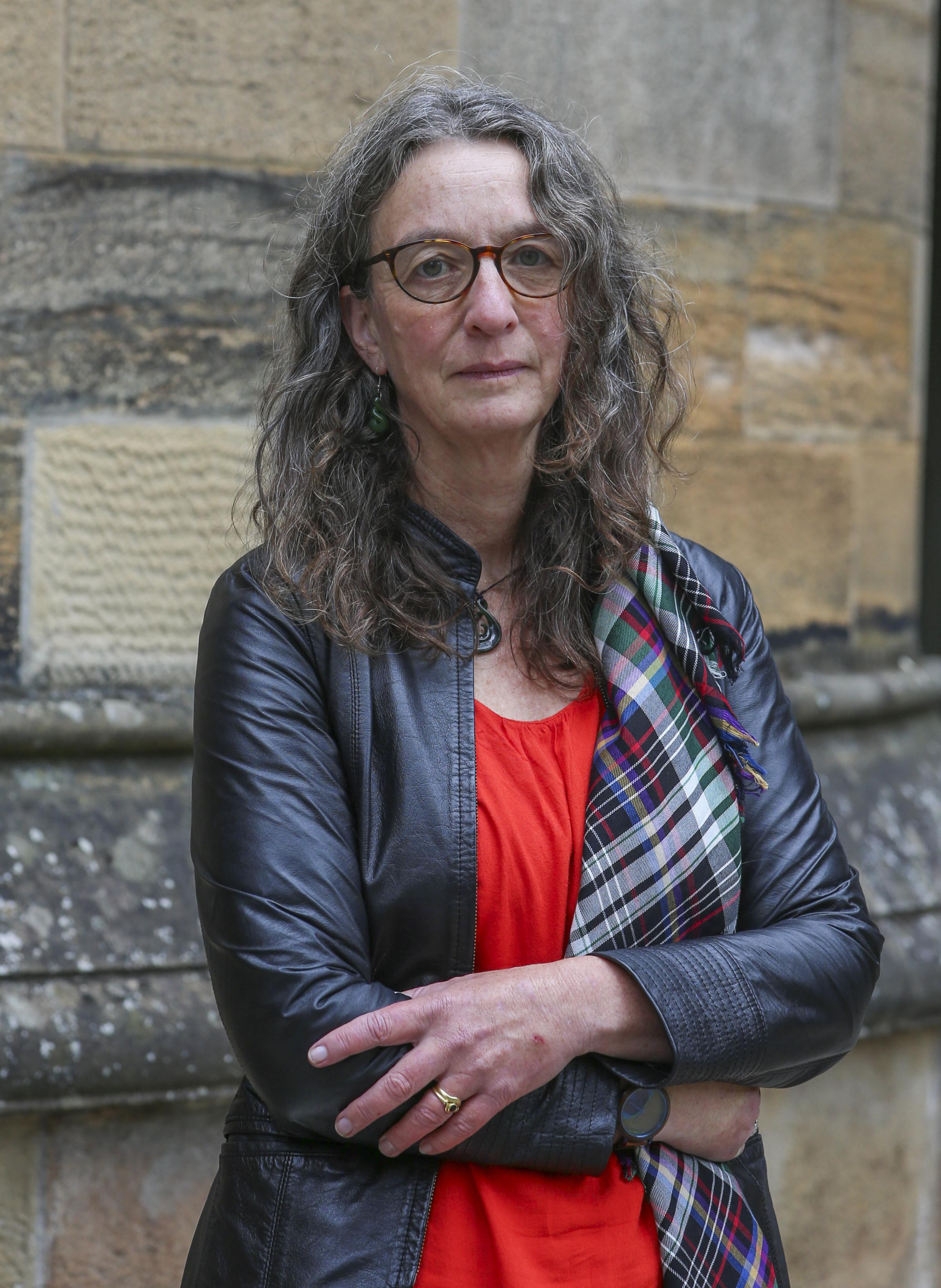
Prof Alison Phipps of Glasgow University. Photo: Gordon Terris /Herald & Times
Part of her expertise is the study of genocide, including the causes of the Holocaust, and work on the Bosnian genocide. Phipps says her work has led her to conclude that the political rhetoric around refugees and migrants in Britain has taken the country into “the foothills of genocide”.
She points to some of the extreme behaviour and comments around anti-asylum protests, such as demonstrators holding banners reading “kill ‘em’ all”, Lucy Connolly – a Conservative councillor’s wife – calling for asylum hotels to be set on fire, and demonstrators giving Nazi salutes.
“We’re getting very close to something terribly tragic like Rostock happening,” she says. Rostock, in Germany, was the scene of violent rioting when mobs set light to an apartment block housing asylum seekers. Neighbours cheered on the rioters.
Phipps refers to the “the 10 stages of genocide” by the international organisation Genocide Watch. The full list includes: discrimination, dehumanisation, polarisation, preparation, persecution, denial, and extermination.
Britain has ticked off a number of these warnings signs, she believes.
When it comes to “dehumanisation” – which is stage four – Phipps says that political rhetoric, such as refugees referred to as “swarms” or an “invasion”, fits the definition.
When asked directly whether she is saying that academic checklists warning about the steps towards genocide are now being ticked off in British society, Phipps replies: “Absolutely.”
Phipps said that dehumanisation by political leaders appeared in David Cameron’s reference to “swarms” of refugees in 2015. “We had a Prime Minister doing stage four. We turn on the news and hear hate speech and propaganda from the media. It’s in our press on the front page.”
Phipps also noted Theresa May’s calls for a “hostile environment”.
Murder
STAGE five of the Genocide Watch list is “organisation”. Phipps believes that the organisation of far-right riots, co-ordinated on social media and with “money flowing in”, ticks that warning box.
Another stage is “denial”. Phipps says this involves people saying “we’re not like that, we don’t do that, this isn’t who we are, this isn’t something we could ever do in Britain”. However, she points again to banners urging the murder of asylum seekers and calls to burn down hotels. She refers to another stage: “preparation”. To Phipps, this means the “setting aside of international law”. She notes Reform’s plans to leave the European Convention on Human Rights, and the UN Convention Against Torture, as well as calls for refugees to be interned in camps.
“It’s important to state that every society is always on a path to genocide potentially,” Phipps explains. “It’s something humans keep doing to ourselves. We say ‘never again’, but it happens again and again. The reasons it happens repeatedly is that states didn’t have the courage to act and society suddenly finds itself over a cliff.
“Genocide is something humans are capable of when international and domestic safeguards are eroded.”
Read more Neil Mackay
Neil Mackay: English nationalism will be the death of the union
Neil Mackay: Nazi salutes and why you should believe the evidence of your own eyes
Neil Mackay: Politics is a sadist realm, a whirlwind should sweep these monsters away
Neil Mackay: We badly need a legal route to indyref2 … here’s how we do it
Genocide, Phipps says, “begins culturally, often in language first. Violence always has cultural seeds. It’s why hate speech legislation is vital as a preventative measure”.
The political rhetoric in Britain around refugees “has characteristics that you can find in descriptions of the processes of genocide. There are ticks being made on the list. Genocide is a process not a single action or event”.
In terms of how many stages of genocide Britain has met, Phipps says: “I think we’re sitting at around four, but with elements of five.”
She adds: “We’re in the foothills of genocide, and worrying signs which scholars use to identify the process of genocide are present in society and require remedy.”
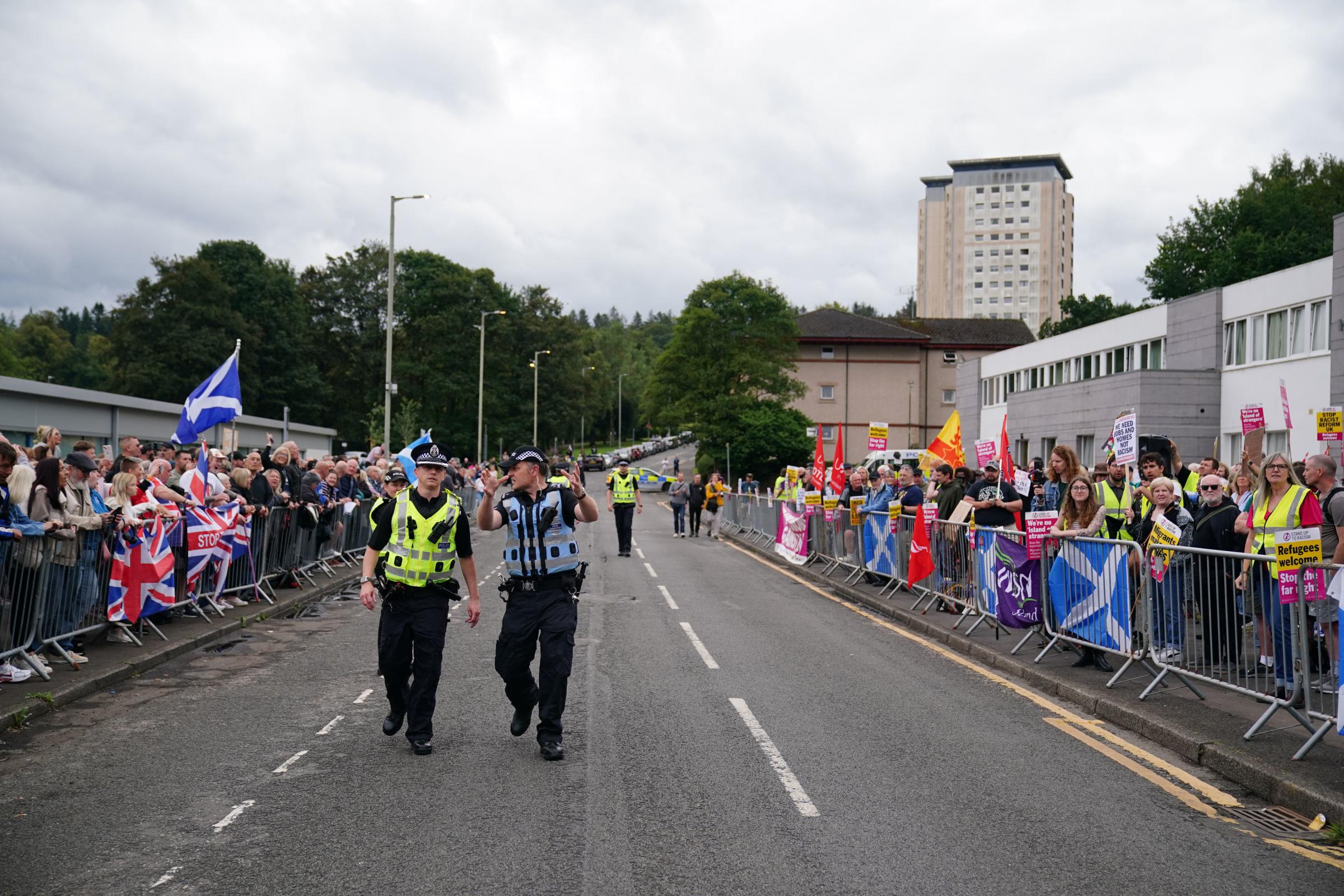
Protesters and counter-protesters in Falkirk where tensions are high
Phipps, however, says that in terms of deterring extremism she’s “encouraged by the rate of prosecutions from last summer’s riots. Swift action is important”.
However, she fears that “more lives will be lost”. An asylum seeker was murdered, for instance, in Glasgow in 2001.
She believes newspapers which push dehumanising rhetoric should face harsh criticism from political leaders and be “given warnings with regard to use of language”. Society shouldn’t “conflate” protecting free speech with hate speech.
Phipps wants a complete change to the “toxic” discourse around refugees. She feels that even the term “asylum seeker” fuels discrimination as it reduces people to just one aspect of their lives: their immigration status. She prefers the phrase “people seeking asylum”.
“It’s a significant nuance,” she believes. Words like “asylum seeker” and “refugee” are now commonly used as “abuse on the street”.
Horror
THE term “New Scots”, for people granted the right to live in Scotland, is an important step change, she believes. “Being alert to language is one of the key tasks.”
She’s critical of the way the UK Government “inflicted” asylum policies on Scotland, beginning with the Blair and Brown governments.
“There wasn’t consultation about how asylum dispersal would take place. The early days in Glasgow were a horror show. The city was ricocheting from the effects of government policy that hadn’t been thought through, and hadn’t the necessary supports and preparations place.”
Phipps notes the changeability of politicians on migration. During the Syrian war, when refugees were fleeing, the body of a three-year-old boy washed up in Turkey in 2015.
“We had politicians in floods of tears,” she says. That led to the creation of the vulnerable person’s resettlement scheme by the Cameron government. It brought 20,000 Syrians to Britain.
Yet today the political rhetoric is “fundamentally toxic and extremely dangerous. It’s hysterical. Fear is being stoked”. Social media discourse is “terrifying”. Refugees have been “othered” and “crammed together in hotels, in a highly exposed situation”.
Protesters, Phipps says, are being encouraged to blame “failing public services” – like long waiting lists and decaying schools – on a group “who can be scapegoated. They want to blame someone, and they’re being given that on a silver platter”.
She adds: “We’re in a precarious situation of increasing anger. We’re at the point where, in Scotland, the kind of violence that we saw in Rotherham [where there was an attempt to burn an asylum hotel] could erupt.”
Heavier policing is needed at anti-migrant protests in Scotland. The current level is “insufficient. We’re at a moment where people don’t know what to do with their rage”.
Phipps, who is from a working-class background in England, says she understands the anger in “marginalised” communities, but adds the wrong people are being blamed. Refugees aren’t responsible for housing shortages and the inability to see GPs – bad government policies are to blame.
“Brexit meant a lowering of living standards, services and life expectancy for everyone but the super-rich,” she says. Protesters “are being actively encouraged to blame a tiny number of people”.
She works with colleagues “who are now daily on the end of racial abuse, their families are scared to go out, things are thrown at them, they’re abused on transport or walking the street, or in the park with their kids”.
Phipps adds: “They’re reporting fear in Scotland for the first time and we’re having to change how we work to keep staff safe. We’re in a very bad place indeed.
“I fear for my grandchildren who are in school and hearing abuse they should never hear, manifesting in questions that should never be asked of anyone about the colour of their skin.”
Phipps has received death threats. “I’m careful, but I do my work,” she adds.
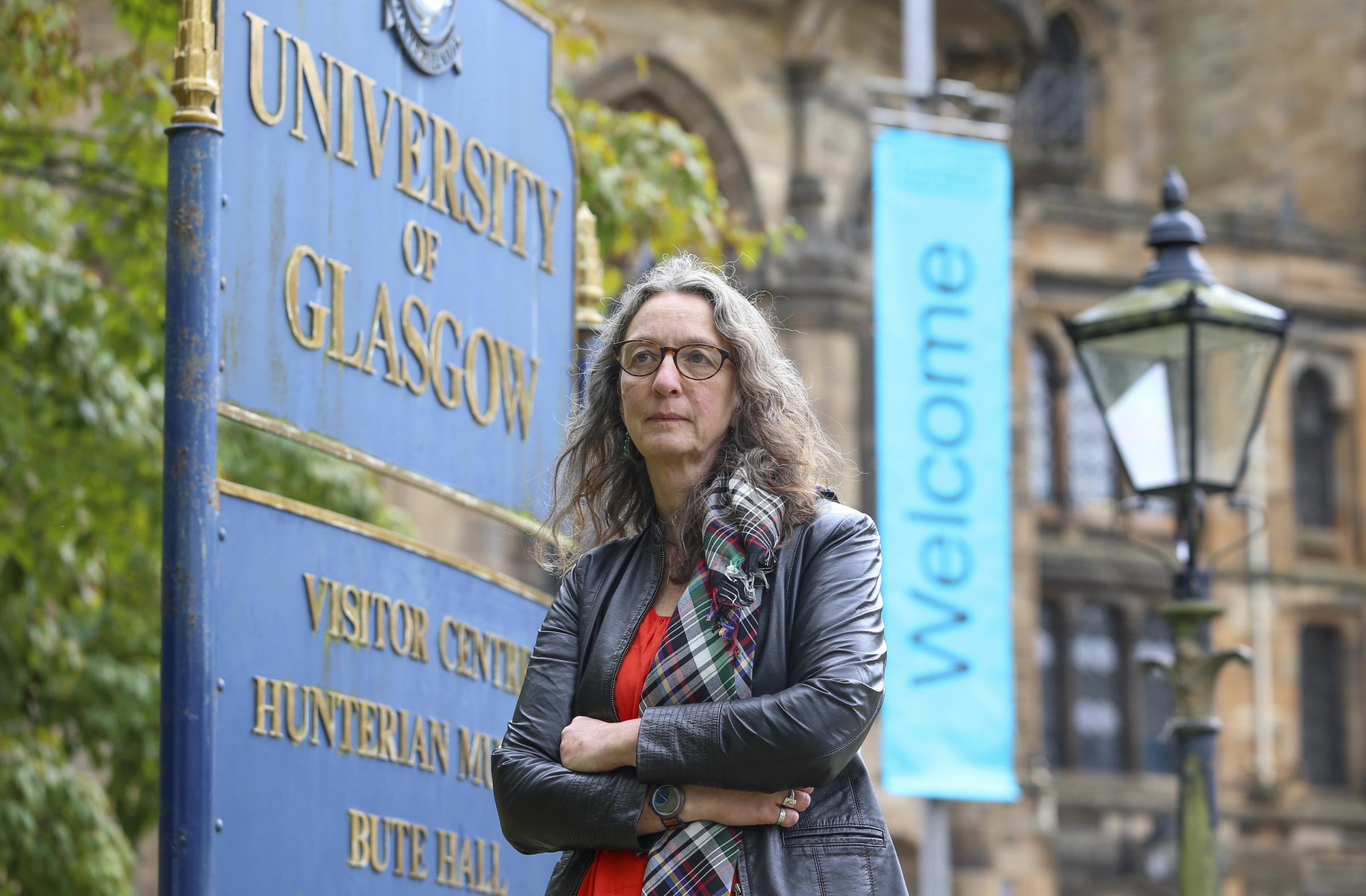
Prof Alison Phipps of Glasgow University. Photo: Gordon Terris /Herald & Times
Violence
THE difference between today and the brief rise of the National Front is, says Phipps, down to the fact that, in the 1970s, “political leadership stopped it. I know from research I’ve been doing for Unesco that leadership and language are absolutely critical to how the cultural seeds of violence – and the cultural seeds of peace – are cultivated”.
There is, she adds, “definitely very strong racism growing within Scotland now”.
However, public attitude surveys still show a “significant gap between England and Scotland”.
“The big difference isn’t that Scots are more or less susceptible to being wooed into racism, and the fear that can be cultivated around ‘the other’,” she explains.
The difference is that political leaders in Scotland have spoken out loudly against racism and the far right. “You need that leadership from your politicians.”
At Westminster, the approach has been to tell refugees they “aren’t welcome”. She refers to Westminster politicians as “spineless at best”, and at worst “deliberately fanning flames for political gain from xenophobic policies”.
The current political environment in Britain means animosity “will grow as there’s nothing to stop it”.
The vast majority of political rhetoric in Scotland led instead to an atmosphere which brought about Glasgow’s Kenmure Street protest, when demonstrators prevented an immigration raid.
“Governments only govern with the will of the people,” Phipps says. “On that day, the people withdrew consent for the politics of xenophobia.”
Political language around refugees in Scotland is mostly “very good. Language has an important performative role”.
She references First Minister John Swinney’s speech this week in which he spoke of “common humanity” and Scotland’s “commitment to the oppressed and those seeking sanctuary”.
Swinney said: “Our Saltire is a flag of welcome… refugees are welcome here.”
Phipps said the speech was moving and applauded it. She added that Scotland was the only nation which the UN High Commissioner for Refugees said was “upholding the spirit and letter of the refugee convention”.
She does worry, however, that the mood in Scotland risks being soured by Reform MSPs in Holyrood. Despite the positive rhetoric from Edinburgh, Phipps says the Scottish Government’s powers over immigration are “a sticking plaster on a sore that’s having toxic microbes poured into it every day and is festering”.
Phipps is astonished that Labour and Conservative politicians “couldn’t see that their policies would produce” the rise of the far right.
“Look at our Prime Minister’s X feed [his social media account on Elon Musk’s platform], with its constant demonisation of people exercising their right to seek asylum in Britain – a country that has signed the Refugee Convention.”
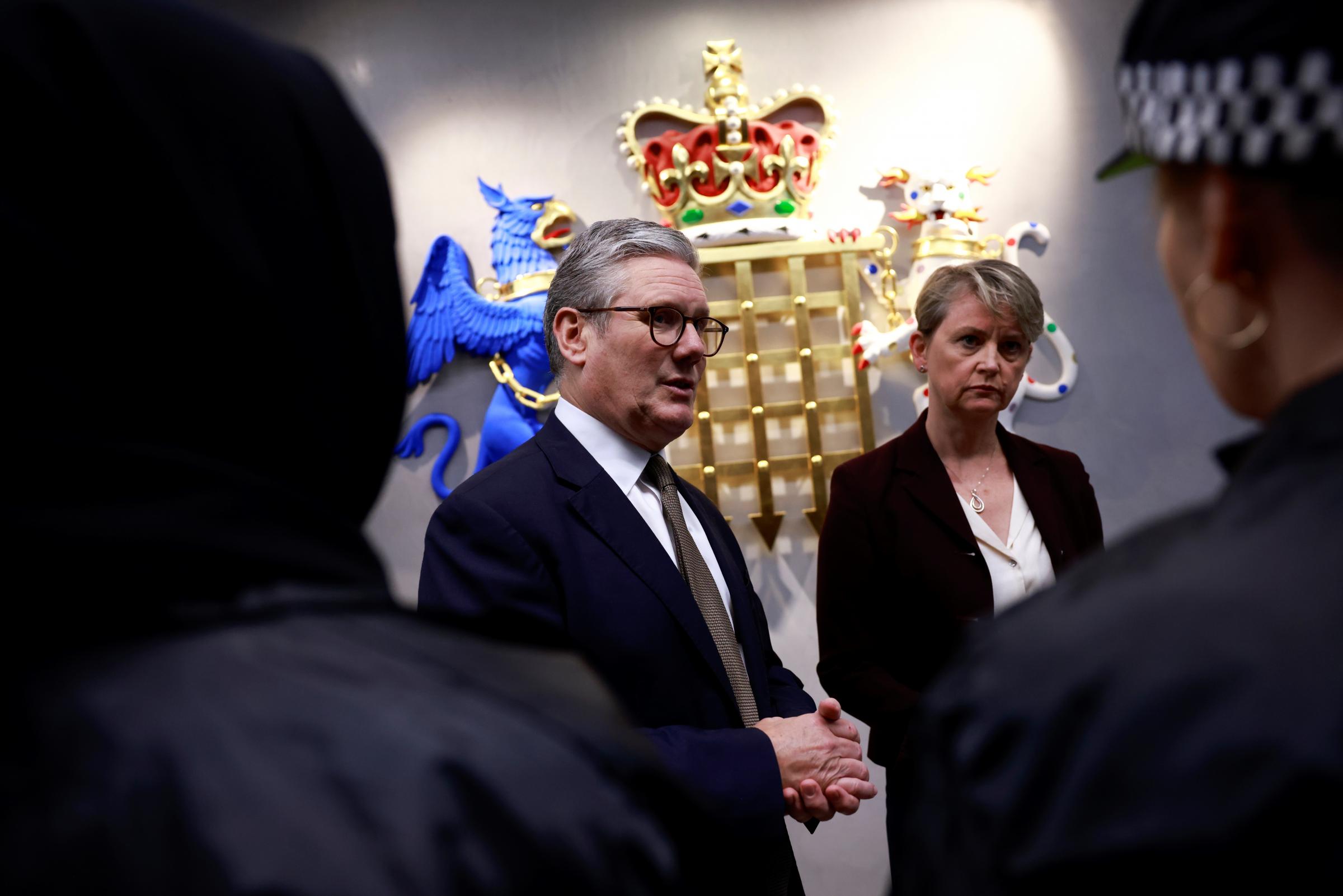
Prime Minister Sir Keir Starmer and former Home Secretary Yvette Cooper
Empathy
THE only way to create a “good, healthy, integrating society is to exercise empathy”. Phipps believes Westminster politicians have chosen to demonise refugees “as they think it’s a road to power”.
At the same time as political decisions have gutted British communities, especially poor communities, UK policy has turned refugees into a “deliberately cultural alien life form”.
Hotels – “effective detention centres with atrocious conditions” – should be closed down, Phipps says.
Asylum seekers should be allowed to live in the community and work so they can integrate.
She notes that Ukrainian refugees can live in the community and work. “They were given respect,” Phipps adds.
But refugees from countries like Eritrea and Sudan “are locked up in hotels with no hope of it actually ending, awaiting a time when we’ll deport them”.
Liberals failed to make the case for immigration, Phipps says. “We did the same with Brexit.”
Good education policies could have “normalised living well with difference” – which she sees as the key to integration. Instead, there are now “people making a lot of money out of producing these very dangerous fissures in society”, Phipps adds.
The “warning signs” of violence, Phipps believes, “have been there quite a long time”. Westminster politicians and the media have “demonised” refugees and encouraged the public “to fear and hate”.
This is how, she says, “we got to a place where ‘Kill ‘em all’ is on a poster outside an asylum hotel. We’ve got to protect the lives of people seeking sanctuary”.
In terms of her belief that steps are being taken towards conditions which encourage genocide, Phipps says that matters are worse in America where the establishment of the detention centre known as “Alligator Alcatraz” could be seen as part of Genocide Watch’s “preparation” stage. “It’s in violation of so many human rights.”
Phipps also blames “billionaire tech bosses” for “manipulating” public discourse and speeding up the “erosion of the guardrails that were put in place in democratic societies”.
The “glue” that holds society together has gone, she adds.
“There’s nothing left and blame is being allocated.”
Most settled refugees are happy in Scotland, she says. Their biggest worry about life here is “the weather”. However, in England, “they’re scared. They’re experiencing behaviour they fled from”.
Everyone in hotels, though, “feels they can’t walk down the street, they feel too scared to come out. There’s genuine fear”.
Over the years, Phipps brought 11 people to live with her and her husband. All were “destitute”.
When Rima arrived – who Phipps later fostered – she was 15 and facing deportation.
“She was lost. She was basically put on the street and threatened with immediate deportation. She didn’t understand what was happening to her.”
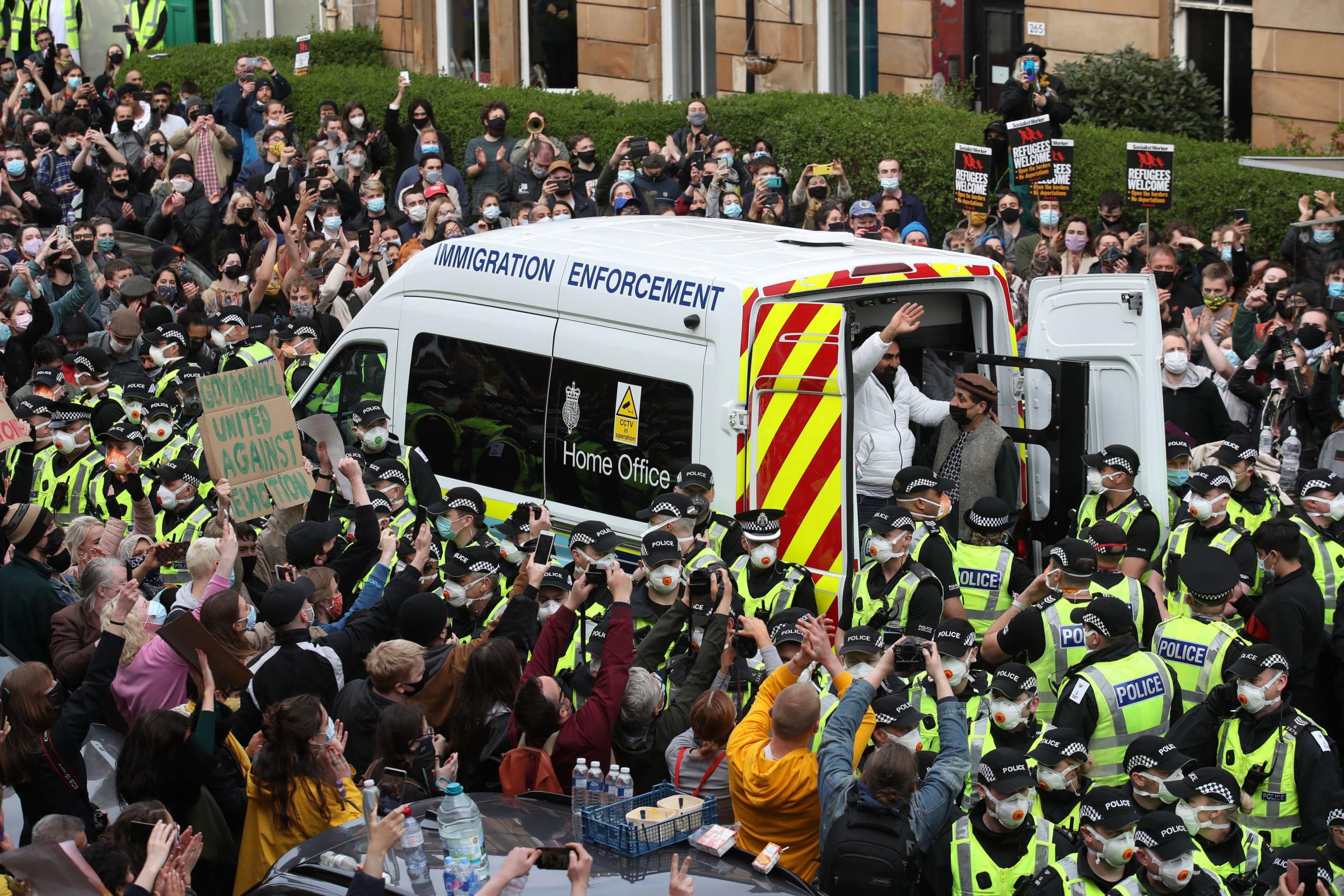
One of two men are released from the back of an Immigration Enforcement van accompanied by Mohammad Asif, director of the Afghan Human Rights Foundation, in Kenmure Street, Glasgow which is surrounded by protesters
Illegal
PHIPPS turns to the question of why refugees would come to Britain given how hostile the country has become. People need to understand, she explains, how strong Britain’s cultural pull is for many overseas, particularly from former colonies. Britain’s claim to defend the underdog resonates internationally, for instance.
Children in former African colonies “read Enid Blyton’s Famous Five”. They are taught English, and learn about “British culture. Zimbabwean textbooks have guys wearing bowler hats”. Some refugees have family in Britain who came here decades ago. These are all pull factors.
No refugee is “illegal”, she says. Everyone has the right to seek asylum. There is just “regular” and “irregular” immigration, such as small boat crossings. Nor is there any requirement under the Refugee Convention, Phipps explains, to “claim asylum in the first country you come to”.
Under the Dublin Convention, EU states agreed to “burden-sharing” – a phrase she hates – when it came to refugee numbers. But post-Brexit that ended.
The form of multiculturalism that developed in Britain was “flawed”. Too often, people of different cultures didn’t live “side by side in neighbourhoods where they could learn about each other”.
Integration depends on people “not fearing each other” but “understanding each other and becoming familiar with each other, reducing the othering, the fear barrier”. The best way to do that is “just hanging out together”.
We cannot expect every refugee to “be exceptional or a Nobel Prize winner. That’s not integration, that’s exceptionalism”.
She says the way Argyll and Bute Council dealt with the arrival of Syrian refugees was “amazing work”. The community decided to “rub along and accommodate each other”.
The EU’s asylum migration integration fund was used “to do this work in communities, which absolutely safeguards against those genocidal points”. That funding has gone due to Brexit. The only people who can afford safe and legal routes into Britain are the rich through the “extremely expensive visa process”. For everyone else, “there are no safe and legal routes. It’s a myth”.
That leaves only “irregular” – not “illegal” – routes. The use of inaccurate terms like “illegal” only adds to “demonisation”.

Today’s Herald on Sunday front page
Danger
WHAT if someone from Iran or Sudan – where a devastating civil war is unfolding – wanted to seek asylum in Britain and went to the UK Embassy in Khartoum or Tehran asking for help? “They won’t process anything,” Phipps says. “I know that, as I’ve people in Sudan who are constantly trying to see if there’s a way.
“If you have a spouse or child under 18 in this country then you could apply through the Red Cross for family reunion, but it’s a very long and precarious process. I know – as I’ve gone through it with numerous people.
“It requires you to go to the UK Consul in, say, Tehran, pass an English test, and pay a lot of money. It requires your family here to demonstrate they have an annual income of £42,000.”
If you need to escape the Iranian regime, then going to the British Consulate in Tehran is evidently “going to put you in danger”, Phipps adds. So people can’t and won’t follow such “legal routes” due to cost and risk to their lives.
The last Tory government “stalled the processing of asylum claims”, allowing a huge backlog to build up, creating the “ticking time bomb” we have today. “It meant we had the disastrous situation of more and more people piling up in hotels. It created a beacon of visibility.”
The response of the Starmer government has been to ramp up rhetoric around “stopping the boats” as part of its “desire to stay in power”.
She adds: “You don’t stop the rise of the far right by trying to be far-right lite, or creating fear. If they really wanted to do something about this, they would lift the ban on people working and let them live normally in the community while waiting for their applications to be processed. We have people with exactly the skills we need within the asylum population. There’s no argument why they shouldn’t stay. They have well-founded fears of persecution.”
Phipps warns that many of the post-war rules designed to “stop the rise of fascism” – like the Refugee Convention – are under threat, despite the fact that they were established in the wake of the Holocaust.
She says the housing of refugees and asylum seekers in poor areas shows that the UK Government “is looking after the middle class”. The system of using hotels “should never have happened”.
Phipps “fully understands” why many in Britain’s poorest areas are angry at their economic circumstances. She says that “kid-glove racism” from the middle class and elites gets much less focus. “It’s worse as it’s supposedly acceptable. It doesn’t manifest in shouty language but it’s very dangerous.”
She refers to think tanks pushing anti-migrant narratives, “intellectuals who have been sanitised”, “the ever-repeated use of Nigel Farage on BBC debates instead of giving due proportional time to the Green Party which has more people in Parliament than Reform”.
Why can’t every refugee fleeing war zones be treated like Ukrainians, she asks. Afghans who “fought alongside” British troops are now routinely referred to as criminals and predators.
Sex crime
PHIPPS says that adding in the element of sexual threat to the immigration debate is “absolutely terrifying”. It is, she says, a way to “get people to obey authoritarian rule and perpetrate violence on behalf of the very rich, who are too scared to do it themselves”.
She links the use of sexual threat back to the risk of “genocide” and “the potential for violence that’s in everyone”. Phipps notes there were sexual offenders among far-right protesters and 40% of last summer’s rioters had convictions for domestic abuse. “I’ve the strong sense that there’s an element of deflection in these slurs being thrown about.”
She adds: “Statistics continue to show there’s no correlation. In fact, offending rates for sexual violence are slightly lower in the migrant group.”
Referring to far-right protesters who have offended against women and children, Phipps said they could now “stand on a soapbox and say ‘we’re protecting our women against these men who are all rapists’.”
Moral panic is being layered on top of moral panic, “with small boats and sexuality”.
Phipps says she grew up in working-class Sheffield “where being groped on the street was normal for a woman”, adding: “As a woman, I reserve the right to determine who has been my attacker, when I’m attacked, and not to outsource this to mob rule.”
She says that young men are often the first in families to make the journey to Europe for asylum “as it’s expected they’ll be able to survive longer and be able to protect themselves against predatory sexual violence on the journey”.
Economic migration, where people flee poverty, shouldn’t be seen as invalid or wrong. Phipps considers herself an “economic migrant” who has moved for work. She’s lived in New Zealand and Germany.
Phipps has a number of worst-case scenarios for the future: a “Farage premiership” within five years; a “far right that’s increasingly emboldened”; and more violence on the streets. Only “bold political leadership” will act as a barrier. Economic pain is now starting to hit the middle classes and Phipps notes that “revolutions” only happen “when you start to destabilise the bourgeoisie”.
In terms of violence and deaths, she says we don’t even consider the number of refugees “inside hotels and detention centres” who have taken their lives. There are also “vast numbers” lost in the Mediterranean and the Channel.
What interests Phipps most isn’t “how people become bad or racist, that’s really easy to answer”, but how they become “good”. The answer is role models and use of language. As an analogy, she refers to signs which were erected on Lyme Regis beach saying “10% of fossils on this beach are stolen”. Thefts doubled. When signs were changed to “90% of people don’t steal fossils”, thefts dropped.
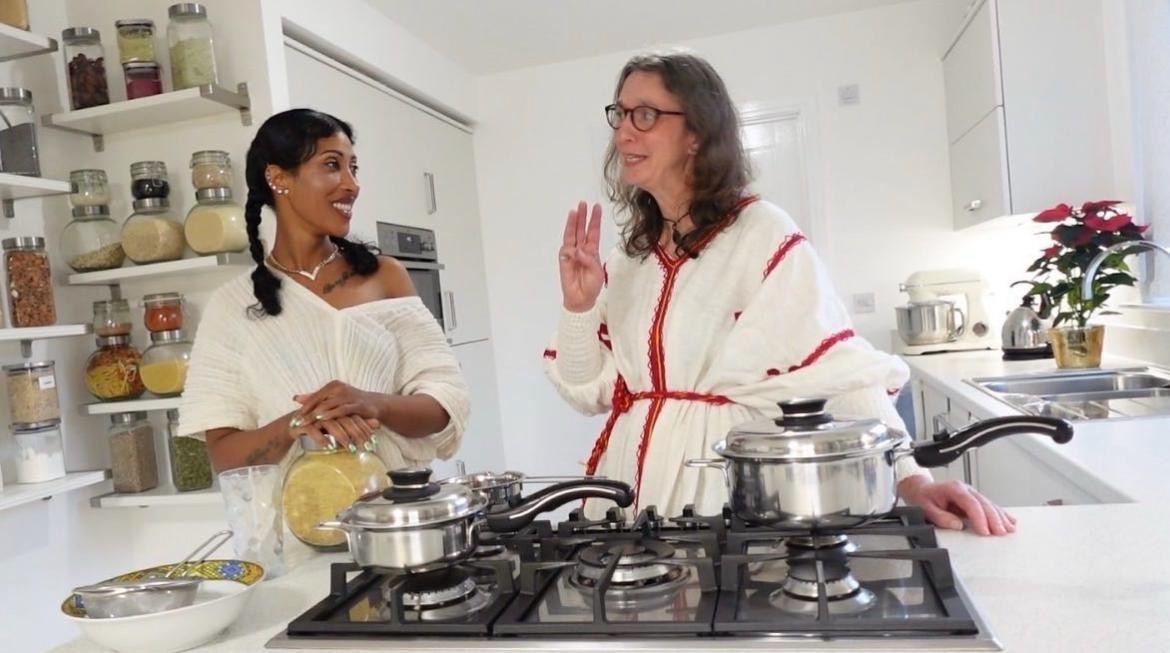
Professor Alison Phipps and her foster daughter Rima who was a refugee from Eritrea
Fear
PHIPPS believes we risk a “dystopian future” where only the rich will be able to move here “because we’ve decided that we’re so fearful of anybody who wasn’t born here or doesn’t have white skin. Would we want that for ourselves? Where our kids can’t work overseas?”.
Britain’s asylum numbers are “tiny”, she says, compared to other countries. Five nations host 37% of the world’s refugees: Iran, Turkey, Colombia, Germany and Uganda. Britain ranks 14th among 27 EU nations in terms of asylum applications.
“We don’t have a problem,” says Phipps. “What we have is a problem manufactured by government of creating hotel accommodation, and public punishment for people who have well-founded fears of persecution and a right to seek asylum.”
The decision by the UK Government to suspend the right to family reunion for refugees “will render refugee women and children overseas radically unsafe, and close yet another safe and legal route, all so a far-right mob is appeased and a far-right discourse is fully entertained.
“It will embolden far-right protesters. It pushes desperate families into traffickers’ hands and grave danger. It will do the opposite of deterring people smugglers. The government has enhanced the business model of the gangs they claim they want to smash. It’s simply wrong, cruel and degrading.”
The suggestion by Reform of repealing the anti-torture convention “tells us everything about those proposing to break the consensus on the taboo of torture and their desire to loose unholy dread into the polity”.
She says: “Torture is wrong. Always. I work with survivors of torture. They are remarkable people. To make this permissible destroys our humanity.”
The entire asylum policy, Phipps feels, “fits a collective definition of cruel and degrading treatment”. Asylum seekers survive on £7 per day. When people are granted refugee status they are evicted from accommodation, such as hotels, often becoming homeless. “So the spiral of misery continues.”
While many anti-asylum protesters “are local”, she says, there are increasing reports of people being bussed in by the far right. Pro-Palestine demonstrations are much bigger but aren’t being given equivalent coverage by the media.
Phipps, who is 58, explains that when she was a teenager she was “regularly beaten by skinheads wearing Union Jacks”. The sight of flags springing up across England worries her deeply. “And I know others who feel the same. Racist abuse is rising at a frightening speed.”
